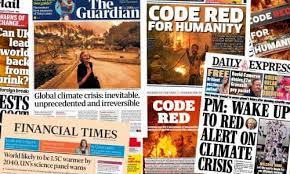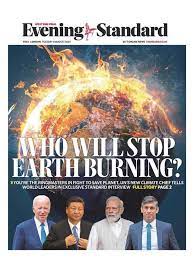Wednesday/Thursday blog
Perhaps one of the most significant statements of 2023 made by one of our rulers came from the universally-respected United Nations Secretary-General, Antonio Guterres. In 2022 he warned us it was ‘code red for humanity’ due to supposed anthropogenic global warming:
Then this year climate expert, Mr Guterres, upped the rhetoric when he claimed: “The era of global warming has ended; the era of global boiling has arrived.�
This summer we’ve been told that July was the hottest on record and we’ve been deluged with reports of ‘apocalyptic’ wildfires in the Mediterranean, the U.S., Hawaii and Canada. So, perhaps Mr Guterres and the climate catastrophists are right? Perhaps we are all destined to die in a planetary fireball caused by our selfish use of CO2-emitting fossil fuels?
However, being a person of a slightly cynical disposition, I googled “2023 record cold”. Here are just some of the results:
- An astonishing -62.4�C was recorded in Tongulakh, Siberia on January 14th. In addition to becoming Earth�s coldest temperature recorded in 2023, the all-time station record was broken in Tongulakh
- On Feb 4, 2023, the Halifax airport in Nova Scotia saw its coldest wind chills ever recorded, with temperature plummeted to -43�C (-45.4�F). This tops its previous record of -41�C that was set on 13 February 1967 for wind chill. Many other places across Canada also set new daily records, with temperatures lower than -40�C.� On Feb 19, temperatures in Shepherd Bay, Nunavut dropped to -49.6�C (-57.3�F)
- The United Kingdom on Tuesday, March 7, braved its coldest night of the year 2023 with the temperatures dropping to below -15 Celsius in several regions. According to Independent, a UK news portal, the British Met Office revealed that the temperature at Kinbrace in the Scottish Highlands was recorded at -15.2 celsius, making it the coldest March in the country since 2010
- The summit of Mount Washington in New Hampshire reported a wind-chill low of minus 78 Celsius (minus 108 Fahrenheit) � the coldest temperature ever recorded in the United States. Meanwhile, the National Weather Service (NWS) in Caribou, Maine, said it received reports of “frostquakes.” “Just like earthquakes, [they]�generate tremors, thundering sensations. These are caused by sudden cracks in frozen soil or underground water when it’s very cold,“
- In Boston, where officials closed down the public school system on Friday due to the impending freeze, the low temperature hit -23C (-10 F), shattering the day�s record set more than a century ago, the National Weather Service (NWS) said. In Providence, Rhode Island, the mercury dropped to -23C (-9F), well below the previous all-time low of -19C (-2F), set in 1918. The arctic blast flowing into the US from eastern Canada also brought record lows to Albany, New York; Augusta, Maine; Rochester, New York; and Worcester, Massachusetts, among other places
- Sydney experienced its coldest June morning on record on Monday, with a minimum temperature of 1.8C at Olympic Park, according to Miriam Bradbury, a senior meteorologist at the Bureau of Meteorology. If you thought the temperatures this month were a little chillier than normal, your feelings are spot on. May 2023 was, as meteorologists might say, really cold. In fact, more than 100 weather stations across Australia have registered their coldest May minimum temperatures on record � with regular frosts, snowfall, and below-average rainfall to boot
- Thursday 1 June saw potentially the lowest June temperature on record in Finland. A weather station in Lapland, Enonteki� Kilpisj�rvi Saana, reached -7.7C. This may not seem that cold for northern Finland, where winter temperatures reach as low as -51.5C, but the last time Lapland saw a minimum temperature of -7C in June was on 3 June 1962
- Extreme cold has arrived abnormally early in Antarctica, with temperatures dropping to below -75�C from the beginning of May.�Following the onset of polar night, winter has started at the South Pole, and with it glacial cold at the Russian research station of Vostok. As early as May 5th a low of -75�C was recorded, while just days ago this fell further to -76.4�C.�This marks a new record for the early winter, daily highs are also plummeting, often just below -70�C on the Earth�s coldest continent
- A sudden and unexpected surge of cold Arctic air has engulfed several regions of South America, shattering numerous cold records in its wake. Although it is currently summer in the southern hemisphere, including parts of South America such as Argentina, Chile, Uruguay, and parts of Brazil, some areas have experienced a drastic and rapid shift in weather, going from a heat wave to frost in less than a week. On February 18, 2023, most of the cities in Paraguay experienced a sharp drop in temperature, breaking their previous records for minimum temperatures. The temperatures ranged between 7 and 16�C (44.6 � 60.8�F) across the country, with the lowest readings recorded in the southeast. The lowest temperature was 7.7 �C (45.9 �F), which is just 0.7 �C (1.2 �F) from the national record low for the month of February. The extreme cold weather caused at least 30 cities in Argentina to break their monthly cold records on the same day
I think that covers most of the Earth’s continents. In fact, I suspect that whichever weather phenomenon you chose – hot or cold, wet or dry – I imagine that if you googled that weather condition and the words ‘2023 record’, you’d find several places on our planet which had record levels in 2023.
I must be getting old and my memory must be failing. While I get the impression we have been bombarded with horror stories about wildfires and an overheating Earth, I can’t remember the BBC or C4 News or any other parts of the mainstream media spending as much time and effort reporting these record cold temperatures as they have spent hyperventilating over their many stories of supposed ‘record hot temperatures’ and ‘Earth on fire’ supposedly caused by man-made global warming.
Could our net-zero-obsessed rulers and their sycophantically-obedient mainstream media be trying to manipulate us into cravenly accepting our own supposedly ‘climate-saving’ impoverishment? Surely, not!
















Thank goodness it is cold as it shows what a clown show all this is. I think they know all too well the cyclical sun activity is pointing to a fractionally colder couple of decades hence the desperation.
But you cannot stop people looking out the window and realising what they are being told is ridiculous. Given the apparent desperation I suspect this ultra liberalism is near collapse anyway and it certainly cannot survive normal interest rates. Most of the clowns working in clown world are funded by the state one way or another and will find themselves non essential when money is tight.
From my experience of winters in England I could say that winters are definitely getting warmer. I was born 79 years ago in a small village in south Yorkshire surrounded by farms. The kids had to walk to school over the fields. Every winter it snowed heavily and at one particular point on the route there was always a snow drift and we had to walk into the field to get round it. Now there is hardly any snow. Why doesn’t that provide the evidence that the climate in England has been slowly getting warmer?
I am reading Jacques Ellul’s book “Propaganda” which you can find free on the internet. He says propaganda works because the majority of people are not interested in the facts or the truth. They just want something they can believe and also to know that somebody is doing something about it. We have our national treasure David Attenborough warning us about the climate crisis, so it must be true. And Greta is his friend. Climate change is apparently the third most important concern of the British electorate, so the propaganda supporting it is believed and working.
I keep saying that it is time to revisit the science claimed to support it, but that of course is settled and agreed by 97% of scientists. There is no greenhouse effect even in a real greenhouse and that has been proven by experiments. Hence, there are no greenhouse gases that in some mysterious way act like a solid, impenetrable layer in the atmosphere. Heat cannot be trapped in the natural world because there is always a temperature difference. If it could, it is a fundamental fact that trapped heat cannot create any warming. Thermodynamics would not exist as a subject if heat could be trapped. It is basically about the movement of heat to do work. I doubt that there is a text book on thermodynamics that discusses trapped heat. It would be absolutely pointless.
Here’s an interesting snippet – Smithsonian Magazine, Feb 28th, 2017.
”While wildfires are a natural phenomenon usually sparked by lightning, it turns out the recent destruction isn�t all Mother Nature�s fault. A new study shows that 84 percent of wildfires in the United States are started intentionally by humans or by human activity.”
”Researchers from the University of Colorado, Boulder�s Earth Lab took a deep dive into the U.S. Forest Service�s Fire Program Analysis-Fire Occurrence Database, analyzing all wildfires recorded between 1992 and 2012. The researchers found that humans caused more than 1.2 million of the 1.5 million blazes in the database.”
”Debris burning starts the most human-caused fires, at 29 percent, with arson the cause of 21 percent of fires. Equipment use causes 11 percent of fires, while campfires and children playing with fireworks or matches each cause 5 percent of fires. The Fourth of July, predictably, is the biggest day for wildfires, with 7,762 fires ignited on that date over the 21-year study period.”
I doubt that much has changed since 2017.